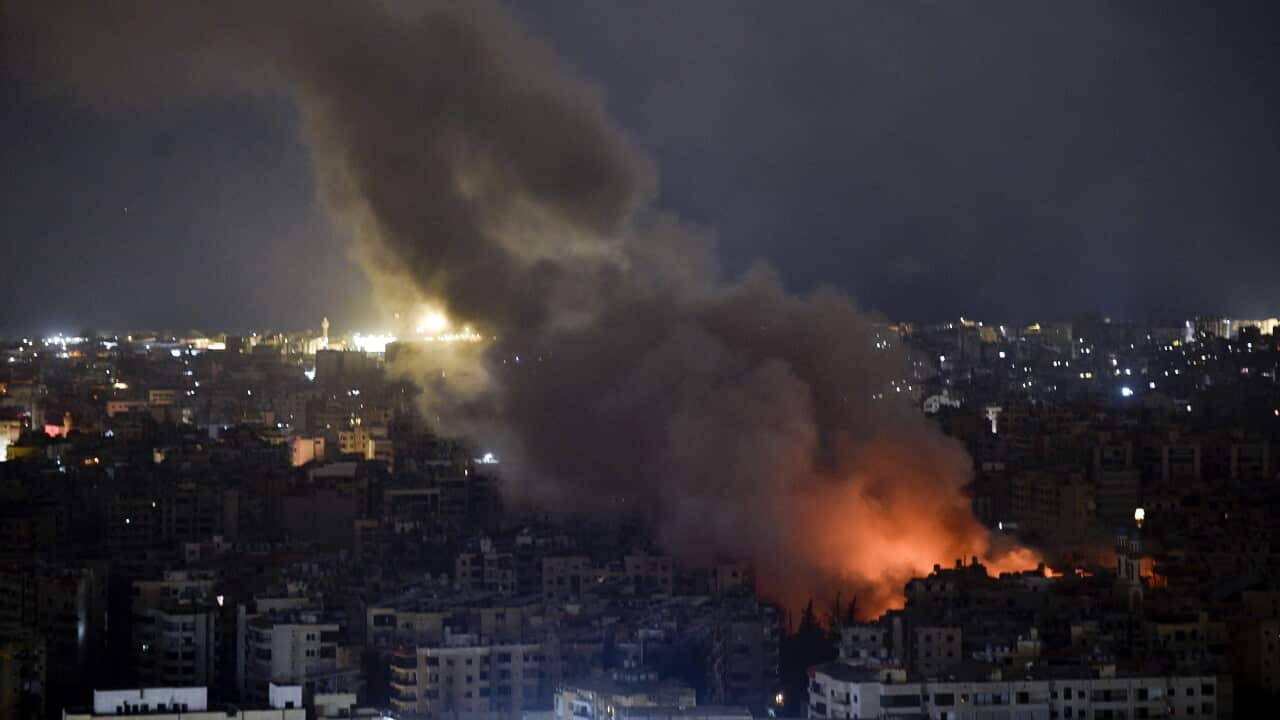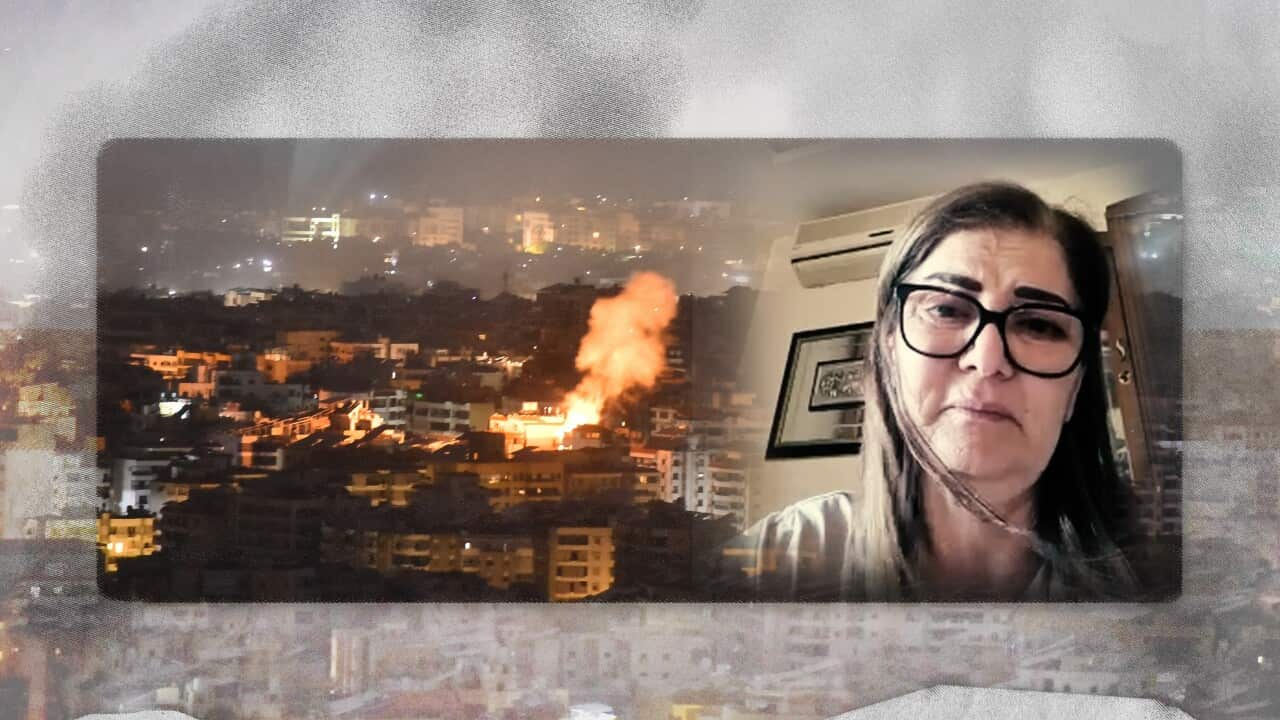Ten-month-old Britt has never known life outside this hotel room in Jerusalem.
"This is not the environment a newborn needs. It's very hard," her father Matan Davidian told SBS News.
"The grandparents and my siblings … they haven't seen her in a year, they don't know her. She's never seen her home. She's lived in a hotel."
Britt's family is from Shlomi, a northern Israeli town that's been heavily targeted since 8 October last year when Lebanese political and militant group Hezbollah began firing on Israel in support of Hamas and Palestinians in Gaza.
The government evacuated them eight days later — before Britt was born.

The Davidian family has been living in a hotel in Jerusalem since October last year when they were evacuated from their home in Israel's north. Source: SBS News
Some 60,000 people have been displaced from Israel's north since the cross-border fighting began, with about half evacuated to hotels where they've been living ever since. More than 1.2 million people in Lebanon have also been displaced.
Seven months ago, Davidian founded Fighting for the North, a group of Israeli evacuees calling for an all-out war with Hezbollah — which holds just under half the seats in Lebanon's parliament.
Some politicians, and many others across the globe, have urged a different course of action, . Australia, the United States, the European Union, and several Arab nations in late September backed a 21-day ceasefire proposal, .

Matan Davidian founded Fighting for the North. Source: SBS News
It's unknown exactly how many people have been killed in northern Israel during the same period, but some tallies have put the death toll as dozens. SBS News has contacted the Israeli government for clarification.
The majority of deaths in Lebanon have occurred in recent weeks, after , wounding thousands of nearby civilians in the process.
Extensive Israeli airstrikes across Lebanon have followed, with .
The Israeli military says it's taken numerous steps to avoid harming Lebanese civilians and described its ground operation in southern Lebanon as "localised, limited and targeted".
The escalation in fighting has prompted countries, including Australia, to organise before the situation deteriorates further.
Davidian believes it's a "war for survival".
"We are aware of the consequences of war, the fallen soldiers, civilians who will be injured, and entire areas that might no longer exist," he said.
"But we also understand the consequences if there is no war. October 7 woke us all up."
In Lebanon, Israeli air strikes have rocked the capital Beirut — and some have spoken of the horror.
Lebanese-Australian Bilal Nassour, who arrived in Sydney on a government-sponsored flight, his house in Lebanon had been destroyed shortly after he fled.
"I was under fire, it was a crisis moment for us," he said.
"I couldn’t find any way to go out if the Australian government didn't bring us.
"Yesterday my house was hit. I left on Saturday, and yesterday the area I was living … all destroyed."
'They want to go home'
Inbar Ben Harush was also evacuated from her home in Israel's north last year, along with her husband, two teenage children, dog, and cat.
"The kids hate it, they want to go home, they miss their friends," she told SBS News about living in a hotel.
When Harush's family evacuated, they only packed for five days.
She now says she'd be willing to stay in the hotel for another year if it meant Israel could create a permanent "buffer zone" in Lebanese territory — something some Israeli government officials have also been calling for.

Inbar Ben Harush's says her children hate living in a hotel. Source: SBS News
'There's no one in Gaza who isn't suffering'
In Gaza, every day of the past year has been a struggle for survival for Palestinians like Saiid Abo Obaid.
"There's no one in Gaza who isn't suffering," he told SBS News.
"Look at the destruction we are living in ... I don't know if I will stay alive or die, and my children are living or dying, and we don't know when this war will end, and there is no safe place to go to."
Saiid and his young family sheltered in tents for four months, when Israel's ground invasion reached Khan Younis.

Much of Saiid's neighbourhood in Gaza has been destroyed by Israeli attacks. Source: SBS News
"What saddens me the most is what’s happening to the kids. They’ve aged ten years ahead of their time," he said.
"When kids can recognise the sound of rockets, it means something is wrong."
Israel has bombarded Gaza since in which more than 1,200 people, including an estimated 36 children, were killed and some 250 hostages taken, according to the Israeli government. More than 41,000 people have been killed in Gaza since October 7, according to the health ministry in Gaza.

Saiid and his family live in what's left of their home in Gaza. Source: SBS News
"It takes a lot of effort just to fill a cup or half a cup, and it’s exhausting, mentally and physically. You are exhausted and working non-stop," Obaid said.
"Everyone is working, everyone is organising, and winter is approaching. Only God knows what will happen to us in winter."
In the year since October 7, Israel has set up dozens of new checkpoints, and approved thousands of and East Jerusalem, according to the United Nations.
Violence between Palestinians and Israeli settlers has also surged.
Silwan is a neighbourhood in the heart of East Jerusalem, where Palestinians want the capital of their future state. Next to their homes are houses Israeli settlers have taken over.

Nasser Rajabi lives in Silwan, a Palestinian neighbourhood in East Jerusalem. Source: SBS News
"Sometimes, just standing at the front door of my house, they (settlers) will tell me to go inside. Where am I standing? Which house do you want me to enter?" he told SBS News.
"[They say] 'I will shoot you. I have the authority to shoot you.'"
Israel began its occupation of East Jerusalem and the West Bank after it
The UN considers these settlements illegal under international law, and the .
The International Court of Justice this year said Israel's occupation of Palestinian territories and settlements there .




